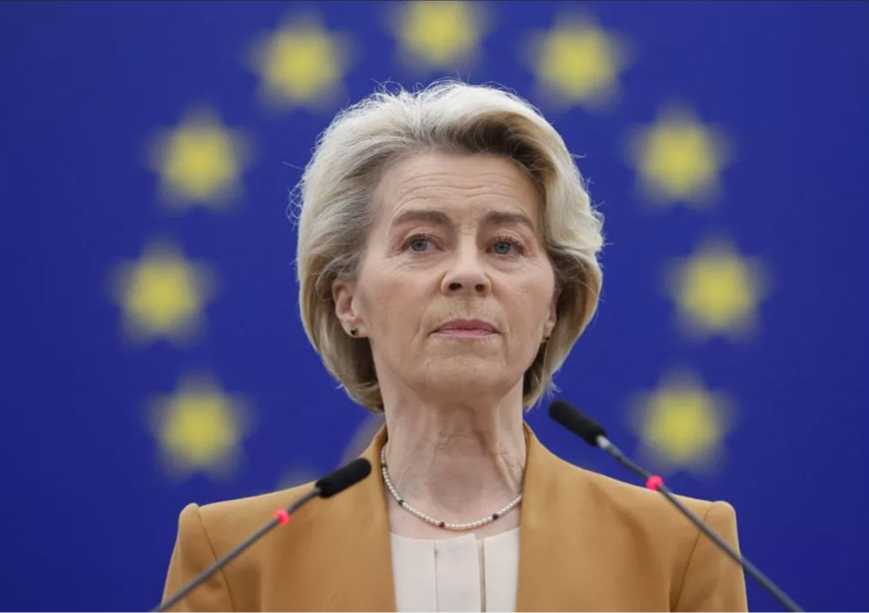-
CENTRES
Progammes & Centres
Location
Although Von der Leyen has proved her mettle over the years, only time will tell if she would be able to maintain her legacy in other critical areas such as the Green Deal and digital transition if re-elected

In a mammoth election year, the European Parliament is heading to the polls on 6-9 June. The Commission presidency is amongst a series of posts, in addition to those of the High Representative for Foreign Affairs and Security Policy and presidencies of the European Council and Parliament, to be consensually fulfilled in a balancing act between member states, regions, and groupings.
At the EPP Congress in Bucharest, current Commission President Ursula von der Leyen secured her nomination as the candidate for her European People’s Party (EPP)—the largest grouping in the European Parliament. This involves a second five-year term at the helm of the European Commission—the EU’s most important institution and executive branch.
As the Commission’s first female president, the former German Defence Minister’s nomination to the role in 2019 was mired in controversy, since it was Manfred Weber, current president of the EPP, who was the EPP’s Spitzenkandidat—a process in which political groups nominate a presidency candidate. In a parliament comprising 747 MEPs, she was elected by a thin majority of 383 votes, only nine votes above the 374 vote margin. This time round, until June 2024, von der Leyen will juggle between her role as Commission President and EPP Spitzenkandidat for the post, which will extend her current mandate beyond October.
Von der Leyen’s effective leadership earned her the number one rank on the Forbes’ 2023 list of the World’s Most Powerful Women.
Under her leadership so far, the EU steered the continent through the COVID-19 pandemic; created legislation to deal with climate change, migration and digitalisation; came up with ways to tackle the China challenge; and led the response to Russia. Von der Leyen’s effective leadership earned her the number one rank on the Forbes’ 2023 list of the World’s Most Powerful Women.
At the helm of the EU, von der Leyen vowed to create a “Geopolitical Commission”. As the Ukraine war carries on into its third year, she continues to navigate a tough geopolitical climate through her staunch support of Ukraine. Under her leadership, the Commission led the European response against Russia adopting 13 packages of sanctions and managing the ensuing disruption of energy supplies.
By granting EU candidate status to Ukraine, the Commission put the bloc’s enlargement back on the agenda. As von der Leyen reiterated, “In a world where size and weight matters, it is clearly in Europe’s strategic and security interests to complete our Union”. Coupled with ways to expand Europe’s defence capability and industrial base through higher spending and joint procurement, she plans to appoint a new EU defence commissioner.
According to a report by the European Parliament, at least 420 (69 percent) of the 610 initiatives that von der Leyen initially announced have been tabled. Her navigation of the COVID-19 pandemic, including the EU’s joint vaccine rollout and a €750 billion economic recovery fund, earned her the reputation of an effective crisis manager; and coupled with the Russian response, strengthened the role of the EU and deepened European integration. Her mandate also oversaw the completion of Brexit.
Coupled with ways to expand Europe’s defence capability and industrial base through higher spending and joint procurement, she plans to appoint a new EU defence commissioner.
With the EU’s strategic outlook in China revealed in 2019 and later with its ‘de-risking’ approach, von der Leyen’s leadership provided clarity and set the tone for member states to reevaluate their ties with an assertive China and enhance the continent’s economic security. In addition, the EU is investing in diverse global partnerships, including with India and countries in Latin America, to diversify away from China. At the expense of incurring Chinese wrath, the Commission chief launched anti-subsidy investigations on imports of Chinese electric vehicles.
Moreover, the EU also concluded a migration deal including ‘cash for migrant’ partnerships. Going further, the EPP manifesto vows to triple the size of Frontex, the EU’s border force, along with plans to deport asylum seekers to so-called ‘safe’ third countries to process their applications, similar to the UK’s Rwanda scheme. Despite questions of values surrounding these plans, the EU is moving forward on a policy area that has long been amongst the most contentious issues plaguing the continent.
Amongst von der Leyen’s various legislations, the most significant is the ambitious European Green Deal that aims to make the bloc climate-neutral by 2050.
Climate change was the dominant issue preceding the European elections in 2019, with activists adding pressure on leaders and boosting the popularity of green parties. As part of von der Leyen’s Green Deal, declared the EU’s “man on the moon moment”, numerous files to increase renewables and reduce carbon emissions were adopted.
However, fast forward to 2024 and a fundamentally altered geopolitical landscape has shifted the Berlaymont’s priorities towards defence, competitiveness, and combating inflation. The historic deal is now facing political pushback, not least from von der Leyen’s own EPP, and from member states such as Poland and France in the context of raging farmer protests. The regulation, increasingly viewed as endangering industrial production, has drawn the ire of the rightwing, who are expected to gain ground in the upcoming election. In addition, cheap imports from Ukraine have further angered farmers.
The historic deal is now facing political pushback, not least from von der Leyen’s own EPP, and from member states such as Poland and France in the context of raging farmer protests.
If her State of the Union address in September last year is any indicator, von der Leyen is now walking a tightrope between addressing the concerns of farmers and businesses by offering regulatory concessions and resorting to more industry-friendly rules. In a phenomenon observed throughout Europe, the likely ascendance of the right has seen positions on key issues such as migration shift to the right, and climate watered down, in a bid to prevent votes going to the far right. Yet von der Leyen also needs reinforcement from the Greens and Socialists who are against backtracking on the climate agenda.
The EPP is leading the polls, making von der Leyen’s second term highly likely. She also has the support of key leaders German Chancellor Olaf Scholz and French president Emmanuel Macron, while maintaining ties with a range of European leaders of varied political dispositions. These include Spain’s socialist PM Pedro Sánchez, Greek PM Kyriakos Mitsotakis, Polish PM Donald Tusk, and far-right Italian PM Giorgia Meloni—a key figure in the European Conservatives and Reformists Group (ECR) group, whose support could be pivotal to von der Leyen’s re-election.
On the other hand, garnering the support of her adversary Hungarian PM Viktor Orban may be a challenge. Von der Leyen will also need approval from the new European Parliament, not an easy feat given that she only came through with a tiny margin last time, and given the probability of a rightward shift this time. Critically, this time, she will also be answerable to voters.
For the EU and its ongoing transitions, strong leadership is vital. Von der Leyen has proved her mettle with her ability to navigate and deliver through troubled waters.
Von der Leyen has often been criticised for her top-down form of decision-making, mainly consulting with her selected German group of advisors and leading to discontent with her staff of 27 commissioners nominated by member states. Her dysfunctional relationship with Charles Michel, President of the European Council, has taken the Commission-Council rivalry to another level. Furthermore, she was lambasted for her unequivocal support of Israel following the Hamas attacks without speaking up about the humanitarian consequences of Israel’s disproportionate Gaza response. As the EU tries to strengthen its security and support Ukraine, it is also bracing for a potential return of Donald Trump amidst Western war fatigue and a stalemate on the battlefield.
For the EU and its ongoing transitions, strong leadership is vital. Von der Leyen has proved her mettle with her ability to navigate and deliver through troubled waters. Time will tell whether she will be able to maintain her legacy in critical areas such as the Green Deal and digital transition and also manage the transatlantic relationship.
Shairee Malhotra is an Associate Fellow with the Observer Research Foundation.
The views expressed above belong to the author(s). ORF research and analyses now available on Telegram! Click here to access our curated content — blogs, longforms and interviews.

Shairee Malhotra is Associate Fellow, Europe with ORF’s Strategic Studies Programme. Her areas of work include Indian foreign policy with a focus on EU-India relations, ...
Read More +